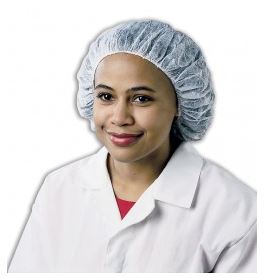We use cookies to make your experience better. To comply with the new e-Privacy directive, we need to ask for your consent to set the cookies. Learn more.
Which of Your Workers Should Wear Hair Nets...or Beard Nets?
No-Shave November is almost upon us, and the more enterprising of your male workers may already be getting a jump on the hairy annual holiday. Every autumn the Movember Foundation challenges men to forego the razor in recognition of men’s health. It’s a great cause and an excellent way to raise awareness, but an influx of moustaches and beards can pose some issues for workplace sanitation.
Men are six times more likely to shed hair from their faces rather than the top of their heads, and that has some food service advocates worried. The good news is that many workplaces already have hair restraint policies in effect, and governmental regulators like the FDA have required both hair and beard nets for years.
By providing employees with comfortable and effective hair restraints, you can help everyone participate in Movember — and keep a sanitary facility throughout the entire year. Just make sure that staff who hold the following positions have convenient access to hair restraints: 
Employees Who Have Contact With Food
Nobody wants to see hair in their food, and all staff in food production positions should wear hair nets, bouffant caps, and/or beard snoods during every shift. The FDA’s 2013 Food Code requires food employees to wear “hats, hair coverings or nets, beard restraints, and clothing that covers body hair” at work.
However, it’s not always easy to define the term “beard.” Some employers dictate the length that facial hair can reach before triggering the beard net policy. At Whole Foods, for instance, beards and moustaches that are shorter than a half-inch don’t require covering, but anything over that limit does (the FDA is uncharacteristically silent on the gray area between scruff and beard.)
Laboratory Staff
Depending on the substances involved in laboratory experiments or chemical manufacturing process, hair and beard nets may be required protective equipment. Not only do they prevent human hair from contaminating samples, they can keep long hair from getting caught in rotating equipment.
Many laboratories require hair restraints for lab workers. Montana State University’s Laboratory Biosafety Manual even lists hair nets among the personal protective equipment that may be required before staff can enter the lab.
Manufacturing Workers at Electronics Plants
Electronics can be extremely sensitive, especially during production. Tiny specks of dirt can be enough to disrupt computer components. Some manufacturers go so far as to work only in designated cleanrooms, which limit microparticles in the air.
Cleanroom apparel often includes hair nets and beard covers. The common-sense rule is that if your product could be harmed by a stray hair, have your employees cover up.
Movember is more focused on moustaches than beards, but that doesn’t mean that beard nets aren’t important gear — they cover all types of whiskers, so if you need to cover a moustache, a beard net is essential.
However your employees choose to participate in Movember, now’s the time to stock up on hair restraints. Don’t make your staff choose between style and workplace hygiene.
References:
“Lab Specific Biosafety Manual - Montana State University.” Montana. Montana State University, n.d. Web. 27 Aug 2015.
“Movember Foundation.” Movember. Movember Foundation, 2015. Web. 27 Aug. 2015.
Shah, Khushbu. “Beard Hair Net Sales Are Booming Thanks to Hipster Chef Bros.” Eater. Vox Media, 13 May 2015. Web. 27 Aug. 2015.
“Worried about dirty beards? Try a beard hairnet.” FOXnews. FOX News Network, LLC, 14 May 2015. Web. 27 Aug. 2015.
